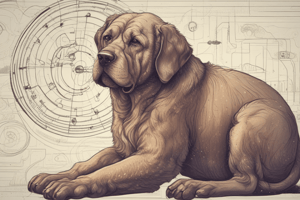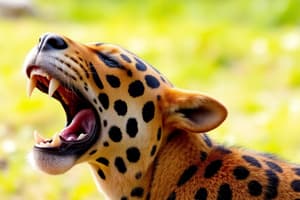Podcast
Questions and Answers
What is conditioning?
What is conditioning?
Conditioning is the process of learning associations between environmental events and behavioral responses.
What are three basic types of learning?
What are three basic types of learning?
Classical conditioning, operant conditioning, observational learning.
How did Pavlov discover and investigate classical conditioning?
How did Pavlov discover and investigate classical conditioning?
He discovered that dogs began salivating whenever he entered the room because they associated him with food.
How does classical conditioning occur?
How does classical conditioning occur?
What factors can affect classical conditioning?
What factors can affect classical conditioning?
What were the fundamental assumptions of behaviorism?
What were the fundamental assumptions of behaviorism?
How did Watson use classical conditioning to explain and produce conditioned emotional responses?
How did Watson use classical conditioning to explain and produce conditioned emotional responses?
How did Watson apply classical conditioning techniques to advertising?
How did Watson apply classical conditioning techniques to advertising?
How has the involvement of cognitive processes in classical conditioning been demonstrated experimentally?
How has the involvement of cognitive processes in classical conditioning been demonstrated experimentally?
What is meant by the phrase 'the animal behaves like a scientist' in classical conditioning?
What is meant by the phrase 'the animal behaves like a scientist' in classical conditioning?
How do taste aversions challenge the basic principles of classical conditioning, and what is biological preparedness?
How do taste aversions challenge the basic principles of classical conditioning, and what is biological preparedness?
How did Edward Thorndike study the acquisition of new behaviors, and what conclusions did he reach?
How did Edward Thorndike study the acquisition of new behaviors, and what conclusions did he reach?
What were B.F. Skinner's key assumptions?
What were B.F. Skinner's key assumptions?
How are positive reinforcement and negative reinforcement similar, and how are they different?
How are positive reinforcement and negative reinforcement similar, and how are they different?
How does punishment differ from negative reinforcement?
How does punishment differ from negative reinforcement?
Flashcards are hidden until you start studying
Study Notes
Conditioning and Learning
- Conditioning is the learning process that connects environmental events to behavioral responses.
- Three primary types of learning:
- Classical conditioning: automatic reactions to stimuli.
- Operant conditioning: understanding voluntary behavior acquisition.
- Observational learning: learning behaviors by watching others.
Classical Conditioning
- Pavlov uncovered classical conditioning by observing that dogs salivated when he entered, associating him with food.
- In classical conditioning, a neutral stimulus becomes associated with an unconditioned stimulus, leading to a conditioned response.
Factors Influencing Classical Conditioning
- Stimulus generalization and discrimination allow similar stimuli to trigger conditioned responses or differentiate from the original stimulus.
- Higher order conditioning involves using a conditioned stimulus from one trial as an unconditioned stimulus in another.
- Extinction occurs when conditioned behavior weakens, while spontaneous recovery refers to the reemergence of extinguished responses.
Behaviorism
- Behaviorism posits that all behavior is a result of conditioning, shaped by past experiences and environmental factors.
Watson's Experiments
- Watson conditioned emotional responses in a baby by pairing a loud noise with a rat, causing fear of fuzzy animals.
- Classical conditioning techniques are utilized in advertising by connecting emotional imagery with neutral stimuli.
Cognitive Influences in Conditioning
- Experimental findings indicate rats actively process signal reliability in conditioning. Rats shocked with a consistent tone showed less fear than those shocked with random tones.
Biological Preparedness and Taste Aversion
- Taste aversions reveal variations in classical conditioning, where rats associate nausea with tastes rather than external stimuli, illustrating biological preparedness.
Thorndike's Learning Study
- Edward Thorndike used hungry cats in puzzle boxes to explore learning via trial and error, concluding that effective responses are reinforced through positive outcomes.
Skinner's Operant Conditioning
- B.F. Skinner's operant conditioning highlights that behavior is shaped by its consequences, with reinforcement increasing the likelihood of repeated behavior.
- Positive reinforcement introduces a rewarding stimulus, while negative reinforcement involves avoiding an adverse stimulus.
Reinforcement vs. Punishment
- Both positive and negative reinforcement aim to increase behavior likelihood, with positive reinforcement adding rewards and negative reinforcement removing unpleasant stimuli.
- Punishment, unlike negative reinforcement, decreases the chance of a behavior recurring.
Studying That Suits You
Use AI to generate personalized quizzes and flashcards to suit your learning preferences.




